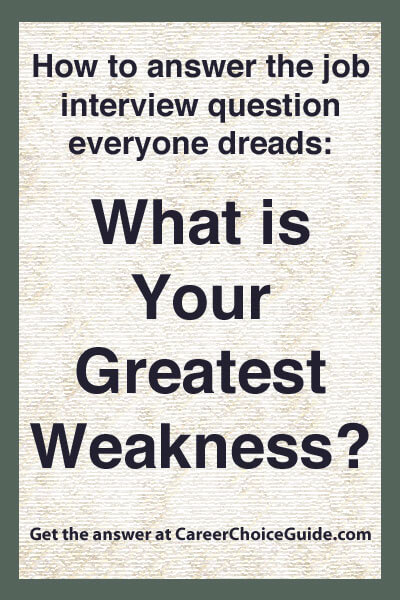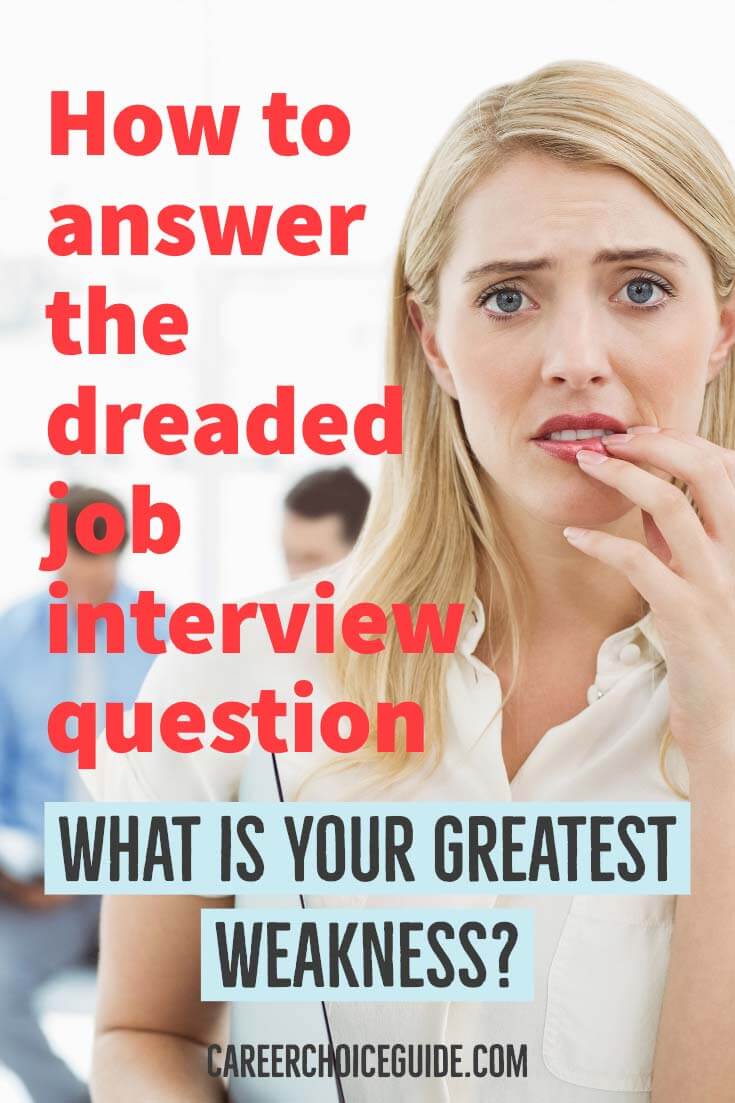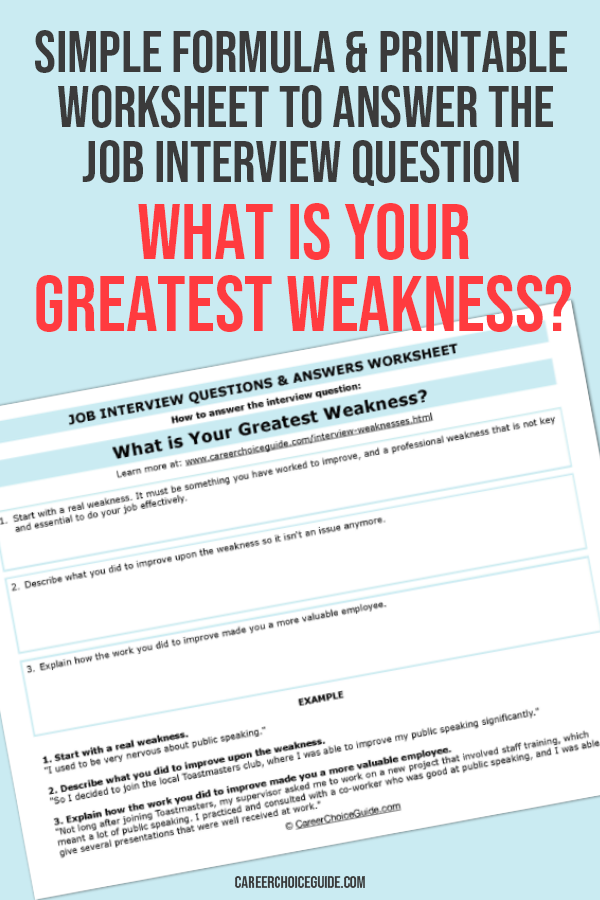What Are Your Greatest Weaknesses?
How to Ace This Tough Interview Question
What are your greatest weaknesses?
If you're job searching, you know that sooner or later you'll be asked this dreaded question. It's a common job interview question that causes stress for almost everyone.
Happily, with a little planning, it doesn't have to be tough to answer effectively.
If you're well-prepared, you'll be able ace the interview weakness question. You can turn it into an opportunity to show employers you are a responsible, proactive problem solver.
How to Ace the Job Interview Question What Are Your Greatest Weaknesses?
To create good answers to any interview questions, it helps to have a little background.
By the time you get through this article you will have:
- a simple formula for answering the interview weaknesses question
- an example answer to this tough question
- and a printable worksheet you can use to work through the formula and generate your own unique and effective answer
But first, you need a little background to help you answer this tough interview question more effectively.
We're going to look at:
- Why employers ask about your greatest weaknesses
- Big mistakes people make when answering this question
- Good weaknesses to discuss when asked in an interview
- And finally a formula anyone can use to create an effective answer, a sample answer, and a printable worksheet to help you compose your own winning answer to this tough question
Why do employers ask about your greatest weaknesses?
One of the biggest secrets to acing a job interview is you need to understand why employers ask the questions they ask.
Common job interview questions aren't always straightforward. Often there are other questions or concerns behind the actual questions employers ask.
If you understand what employers are really trying to learn about you when they ask certain questions, you'll be able to formulate much better answers.
Answers to 300+ job interview questions
Why do employers ask about your greatest weaknesses?
- They want to determine if there are any issues or problem areas that might prevent you from doing a good job.
- They want to know if you have a good understanding of yourself and are able to deal with problems as they arise.
The first reason employers ask this question - to look for any key problem areas - is fairly straightforward. Employers want to see if you will mention any professional weaknesses that would rule you out from consideration for the job. We'll look at how to avoid that pitfall in just a moment.
The second reason employers ask the interview weaknesses question - to see how well you know yourself and how you deal with problems - is a more complex and hidden motive behind the question.
If you understand this hidden question behind the question, you can formulate an answer that shows employers you have a realistic awareness of your own strengths and weaknesses, and when you see a weakness in yourself, you do something about it. I'll explain exactly how to do that after we look at big mistakes you need to avoid when you're asked about your weaknesses in a job interview.
Big mistakes job seekers make when answering interview questions about weaknesses
There are a couple of highly overused answers people commonly give to the interview weaknesses question. These clichéd answers should always be avoided.
Two things you should never say when employers ask, "What's your greatest weakness?"
- Never say, "I have no weaknesses."
- Never say, "I'm a perfectionist."
1. Never say, "I have no weaknesses."
When asked about professional weaknesses, a lot of job seekers answer by saying something like, they have no weaknesses that would prevent them from doing a great job.
On the surface, that may seem like a reasonable answer. You certainly don't want to give the employer any reason to think you shouldn't be hired, and an answer like that allows you to avoid listing any shortcomings. But you're not providing the employer with any new and useful information, which is one of the most common mistakes job seekers make in interviews.
There are several problems with saying you have no weaknesses:
- Everyone has weaknesses, so that answer sounds insincere. (I have weaknesses, but I'm certainly not going to tell you about any of them.)
- It can sound arrogant. (I don't have any weaknesses; I'm not about to take direction from you.)
- Experienced interviewers know you are dodging the question, which is frustrating for them because they don't learn anything new about you.
- You lose a great opportunity to show the employer you can solve problems and deal with challenges when you sidestep this question.
2. Never say, "I'm a perfectionist."
It's true that some people are perfectionists. It's also true that perfectionism can be a weakness.
In spite of that, "I'm a perfectionist." is never a good answer to interview questions about weaknesses.
Why shouldn't you tell an interviewer that you're a perfectionist?
"I'm a perfectionist." is a completely overused, clichéd answer to this question.
Too many people have been given the bad advice that they should answer this question in this way.
If an employer interviews 10 people and asks all 10 job seekers about their weaknesses, it's very likely that 9 people will say, "I'm a perfectionist."
It might be true. You might be a perfectionist, and it might be a weakness for you. But this answer sounds completely insincere to an employer who has already heard it many, many times.
Don't share a long list of your weaknesses.
One more big mistake job seekers make when asked about their weaknesses is that they provide a long, detailed list of all of their weaknesses.
When you're asked about your weaknesses, only provide one example of a single weakness. Do not give the employer a long list of all of your shortcomings.
Even if the employer uses the plural, "What are your greatest weaknesses?" in the question, you only need to name one weakness.
Perhaps an extremely rare employer might push for you to mention a second weakness, but it is very unlikely. Among the 2000 clients I worked with when I ran job search workshops, no one ever told me of an instance when an employer didn't accept a single, good answer to the interview weaknesses question.
Good weaknesses to discuss when asked in an interview
Your goal when you answer questions about weaknesses is to show the employer you have self-awareness and problem solving skills and to avoid raising any red flags.
To accomplish that goal, tell the employer about something that is or was a weakness, and you did something about it to improve yourself and ensure it would no longer be a weakness.
There's nothing wrong with admitting to an employer that you had a weakness as long as you show that you did something to improve upon that weakness.
That kind of answer shows an employer:
- You have a good awareness of your own professional strengths and weaknesses.
- And when you recognize a weakness in yourself, you make an effort to do something about it.
It allows you to demonstrate that you are good at problem solving and committed to ongoing learning and development.
What kind of weakness should you mention?
Beyond choosing a weak area that you have actively worked to improve, be sure to choose an example that is:
- somewhat relevant to your professional work
- but not too central and essential to the job you are seeking
Make sure your weakness is somewhat relevant to your professional work.
Remember, the interviewer is trying to get to know you better as a potential employee. If the weakness example you provide is completely unrelated to work, your answer will cause frustration.
For example, imagine you're a bookkeeper. In an interview, you tell the employer your greatest weakness is that you're not very handy around the house, so you took a woodworking class at your local community center.
That kind of answer will cause frustration. The employer will feel you are sidestepping the question. It provides no real information about the type of work you do as a bookkeeper, which is what the interviewer wants to know.
Make sure your weakness is not too essential to the job you are seeking.
Imagine again that you're a bookkeeper. This time, you tell the employer your greatest weakness is you are not very detail oriented, but you have devised a system to double check your work.
You'll raise red flags in the employer's mind with that answer.
Being detail oriented is essential to that job. Even if you explain your foolproof system for avoiding mistakes, if you tell the interviewer you're weak in an essential skill, you run the risk of disqualifying yourself for the job.
Discuss a weakness that is somewhat relevant to the work but not absolutely essential to the job.
Okay. You're still a bookkeeper. This time, when you're asked about your greatest weaknesses, you tell the interviewer that you used to be a very nervous public speaker. You explain that it was relevant to your last job because you had to do staff training and also present reports to a large room full of colleagues. Finally, you share the specific steps you took to become a better and more relaxed public speaker.
An answer like that will make a positive impression in an interview.
- The weakness is relevant to your professional experience, so the interviewer won't feel you are sidestepping the question.
- It's not too central to the core skills needed to do the job, so you won't raise concerns about your abilities.
- The answer is sincere, so the interviewer will feel he or she is getting to know you better.
- Your acknowledgment of the problem demonstrates a good degree of self-awareness.
- Your solution shows the interviewer that you are able to problem solve when necessary.
Answer the Interview Question, "What Are Your Greatest Weaknesses?" With This Formula
1. Start with a real weakness. It must be:
- something you have worked to improve
- a professional weakness that is not key and essential to doing your job
2. Describe what you did to improve upon the weakness so it isn't an issue anymore.
3. Explain how the work you did to improve made you a more valuable employee.
What Are Your Weaknesses? Example Answer
Let's take that formula and turn it into an actual answer. For this example, we'll go back to our bookkeeper who had difficulty presenting information at large meetings due to a fear of public speaking.
1. Start with a real weakness.
"I used to be very nervous about public speaking. I was fine speaking in small groups, but getting up to speak in front of larger groups was difficult for me."
2. Describe what you did to improve upon the weakness.
"So I decided to join the local Toastmasters club, where I was able to improve my public speaking significantly."
3. Explain how the work you did to improve made you a more valuable employee.
"Soon after I joined Toastmasters, my supervisor asked me to work on a new project that involved staff training and required a lot of public speaking. I practiced, and I consulted with a co-worker who was very good at public speaking, and I was able to give several presentations that were very well received at work.
I still get a bit nervous before I speak in front of a group, but I'm far more effective and confident than I once was."
Job interview advice from job search expert, Martin Yate
Download Your Printable Interview Weaknesses Worksheet
Remember, employers invite you to job interviews to get to know you. That means your answer to this, and all other job interview questions must be honest and sincere.
Sample answers to interview questions are useful to help you understand how to formulate your own answer, but they shouldn't be copied because they won't be honest and sincere.
Happily, you can easily formulate your own effective and honest answer to this question with the simple formula I've provided.
Just download and print the What is Your Greatest Weakness Worksheet to work through the formula yourself, and create an answer to ace the greatest weakness interview question.



